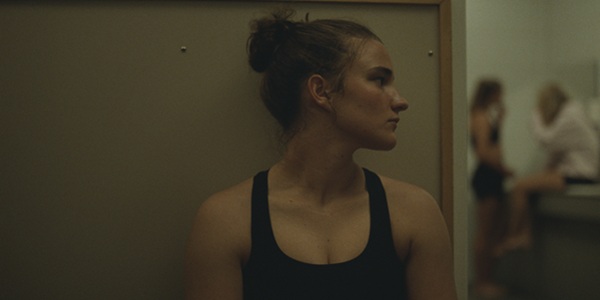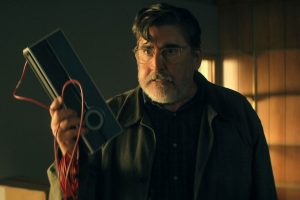
Belgium’s submission for Best International Feature Film at this year’s Academy Awards, Julie Keeps Quiet paints an intimate and empathetic portrait of an elite youth tennis player who refuses to speak up after her coach is accused of abuse. Directed by Leonardo Van Dijl from a script he co-wrote with Ruth Becquart (who also plays Julie’s mother), the film—which has the Dardenne brothers, Florian Zeller, and Naomi Osaka listed among its producers—turns a keen eye towards the culture of anxiety, abuse, and silence that continues to pervade women’s sports at all levels of the game post-#MeToo.
Holding On
Julie (Tessa Van den Broeck, a real-life competitive tennis player making an impressive acting debut) is the star player at a prestigious youth tennis academy in Belgium; her talent is so promising that she trains for free while others must pay hefty fees for the privilege. As she prepares to try out for a spot in the Belgian Tennis Federation, her world is rocked by the news that her coach Jérémy (Laurent Caron) has been suspended following the suicide of another one of his female protégées. When the students at the tennis academy are urged to speak up as part of the investigation into Jérémy’s behavior, Julie—the player who had the closest relationship with Jérémy—conspicuously chooses to remain silent.
source: Film Movement
The pressure on Julie to speak up combined with the whispered rumors about what may have happened between her and Jérémy has an increasingly negative effect on her ability to focus, both on and off the court. It doesn’t help that Jérémy still hovers on the edge of her life, claiming that only he knows what is best for her and her tennis career. Every word that comes out of Jérémy’s mouth via these late-night phone calls and secretive in-person meetings is calculated for maximum control; indeed, Julie’s first attempt at regaining her agency is her refusal to talk about what he did to her.
Still Standing
Julie Keeps Quiet takes a naturalistic approach to telling Julie’s story, neglecting big, bombastic moments in which life irrevocably changes in favor of quiet ones in which life simply goes on. This is a film that understands that it is unnecessary to put both character and audience through an in-your-face depiction of assault for it to be clear that something terrible has happened; there are more subtle and respectful ways to convey such trauma, especially in a film that revolves around things left unsaid and unseen. Physical abuse is never shown on screen or explicitly described in the film, yet abuse is nonetheless present in the thick cloud of tension hovering over the cafe table as Jérémy tries to grab Julie’s hand and she pulls away, or when he insists that she not allow her new coach, Backie (Pierre Gervais), or her father to be present at her BTF tryout, or when he says to her, “When you told me to stop, I stopped…right?”
source: Film Movement
Van den Broeck is not so much acting as embodying the character of Julie, and she does so beautifully. Casting someone with extensive tennis experience adds extra authenticity to Julie’s physicality, which is critical considering that she primarily chooses to speak through her body and her game; with every forceful volley, we can see a little more of her internalized trauma leave her body. The rest of the cast—a mix of professional and non-professional actors—provide admirable support, especially Gervais as the anti-Jérémy, Backie; the gradual evolution of his relationship with Julie is one of the most heartwarming things in the film. Cinematographer Nicolas Karakantsis (I, Tonya, Cruella) often keeps the camera still and at a distance, making those moments when we get up close and personal with Julie all the more impactful; while this style could have potentially given the film a cold and distant feel, the use of 35mm film allows warmth to come through, while the melancholy, vocal-driven score by Caroline Shaw provides a haunting texture to the images.
Throughout the film, we see Julie test the limits of her newfound freedom from Jérémy in small yet satisfying ways. When Jérémy tells her not to listen to Backie, claiming he’s incompetent, she is inclined to believe him, yet the more time she spends under Backie’s tutelage, the more she realizes how much she thrives under his more positive approach—plus, his technical advice is not that different from Jérémy’s.
source: Film Movement
When the other students at the tennis academy invite her to participate in a small tournament with them, she declines because Jérémy would be angry at her for wasting time and risking injury so close to her BTF tryout. But then she decides to go anyway and has a great time, coming home glowing with happiness. Jérémy’s approach to coaching kept her isolated and alone under the guise of that being best for her game, but it turns out having fun and enjoying yourself is just as important to sporting success—something that more youth coaches (and parents, for that matter) would do well to appreciate.
Conclusion
Julie Keeps Quiet is a smart and sensitive debut feature that succeeds in telling a story about abuse of power while empowering, rather than exploiting, its protagonist.
Julie Keeps Quiet opens in New York and Chicago on March 28, 2025, with additional markets to follow.
Does content like this matter to you?
Become a Member and support film journalism. Unlock access to all of Film Inquiry`s great articles. Join a community of like-minded readers who are passionate about cinema – get access to our private members Network, give back to independent filmmakers, and more.










